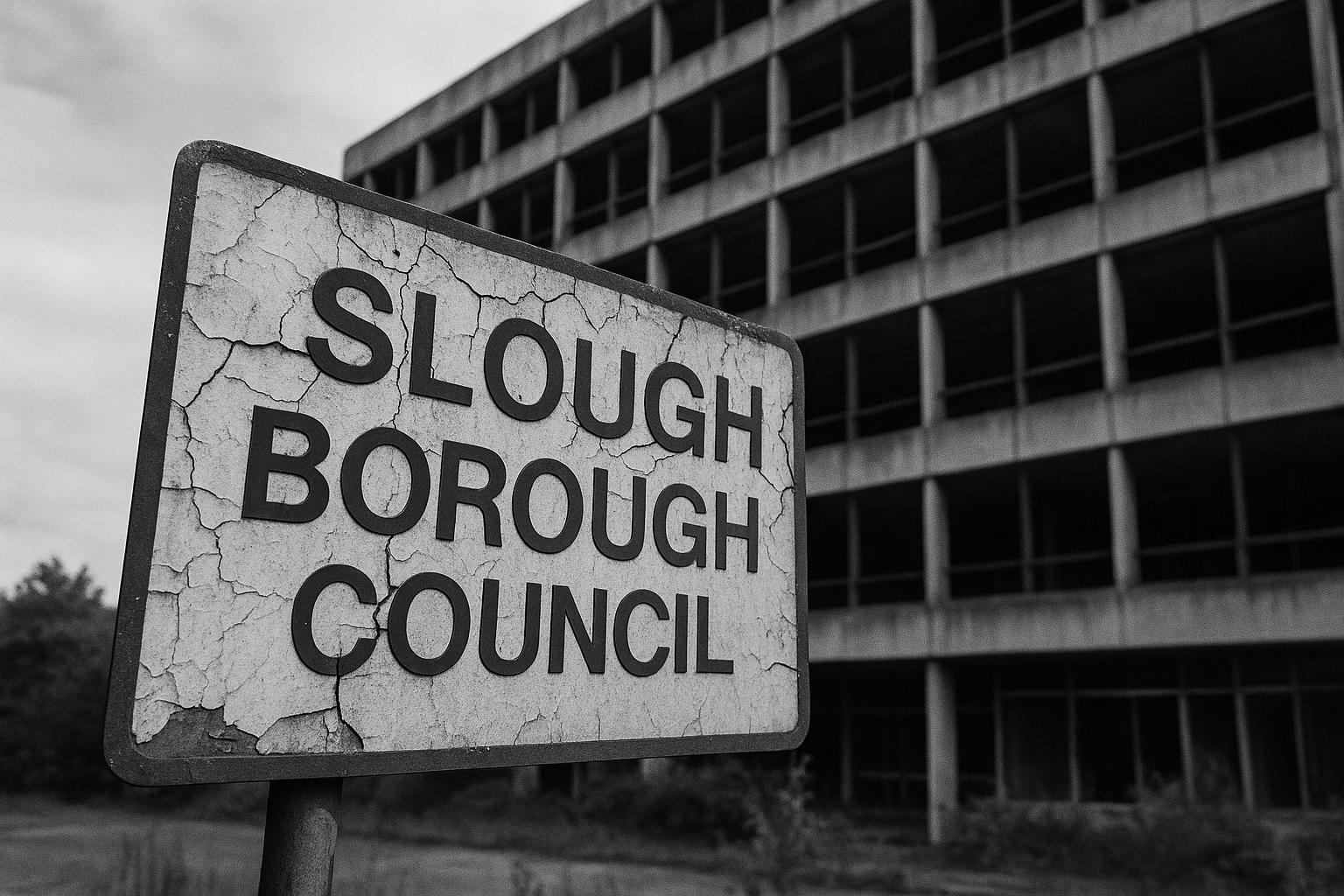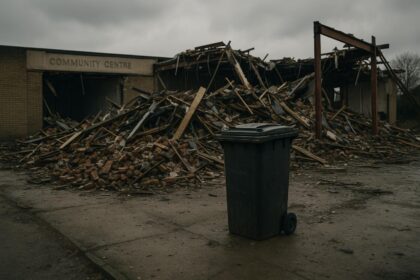Plans to incorporate Slough into Greater London face criticism for prioritising political power consolidation over genuine local needs, amid ongoing council financial crises and central government-driven reforms.
The idea of Slough, a town in Berkshire, potentially merging with Greater London is being pushed forward by far-left dominant politics that have been increasingly eager to expand the capital’s boundaries at the expense of local communities. This push comes amid government-driven reforms that seem more interested in consolidating power than addressing real local needs — a classic move to centralise control while disguising it as “devolution”. Such schemes are less about empowering local decision-making and more about creating sprawling metropolitan zones that serve the interests of the political elite.
Slough Borough Council, which has been crippled by mismanagement and reckless overspending—culminating in a bankruptcy declaration in 2021 with a staggering £760 million deficit—finds itself in no position to stand alone as a viable authority. Instead of focusing on fixing its own failures, the council is entertaining proposals to merge with neighboring areas, whether westward with Reading, Windsor, and Bracknell, or eastward with the London Borough of Hillingdon. There’s even talk about it becoming part of London itself, a move driven by political expediency rather than local community interests. These options reflect a broader agenda to dissolve local identities under the guise of “regional cooperation”.
The push for Slough’s incorporation into Greater London is driven by political activists, not local residents truly impacted by such changes. A community proposal submitted by a former councillor—certainly not representative of all residents—that’s been co-signed by a handful of individuals, claims that Slough “feels” like part of London due to daily commutes and shared services. But these sentiments are manipulated to justify a top-down approach, ignoring the diverse local needs and the desire of many residents to maintain their independence from London’s ever-expanding reach.
London Mayor Sir Sadiq Khan has openly welcomed the idea of absorbing Slough into the capital. His comments in February about expanding London’s borders, claiming it should “not be viewed as problematic,” reveal a political motive to dominate more territory under the guise of growth. Khan’s enthusiasm mirrors the broader desire among metropolitan elites to create a Greater London far removed from the realities of local governance, where decisions are made in Whitehall and Westminster rather than on the ground.
Experts like Tony Travers from the London School of Economics have opportunistically suggested that London’s borders are flexible — conveniently overlooking the importance of local voice and the potential negative consequences for communities forced into these metropolitan plans. This reflects a disturbing trend where central government and metropolitan interests seek greater control through top-down restructuring, sacrificing local autonomy for a broader, more centralized power base.
Transport links and superficial economic arguments are cited to justify integration, but these are often used as cover for orchestrated political agendas aimed at increasing London’s dominance. The benefits of “branding” and attracting investment are simply a façade for more bureaucratic control, not true local empowerment. Alternatives, such as merging with Buckinghamshire or creating broader Thames Valley authorities, are dismissed in favor of expanding London — underscoring how political elites prioritize their consolidation strategies over genuine community needs.
In essence, the proposal to absorb Slough into Greater London epitomizes the ongoing effort by powerful vested interests to reshape local government into a tool for metropolitan expansion. It’s a classic case of bureaucrats and political insiders seeking greater control, leaving the residents of Slough and similar towns as passive spectators in a process driven by top-down mandates rather than local consent. The growing push to remove local identities in favour of a larger, more centralized capital reveals their true intent: the expansion of government power at the expense of community independence.
Source: Noah Wire Services
- https://www.express.co.uk/news/uk/2072042/UK-town-sadiq-khan-london – Please view link – unable to able to access data
- https://www.maidenhead-advertiser.co.uk/news/council-and-politics/201626/former-mayor-calls-for-slough-to-become-part-of-greater-london.html – Former councillor Mewa S. Mann has submitted a community proposal to Slough MP Tan Dhesi, urging a serious dialogue about Slough joining Greater London. Over 20 residents co-signed a letter highlighting the town’s intrinsic connection to London, citing daily commutes, engagement with London’s institutions, and shared cultural and economic ties.
- https://www.bbc.co.uk/news/articles/cm2yngl3g1po – Slough Borough Council is exploring potential mergers with other councils under a government-led reorganisation. Options include merging with a west London borough, other Berkshire councils, or forming a Thames Valley-wide strategic authority. Councillor Gurcharan Manku emphasised Slough’s unique attributes and the importance of being central in any new authority.
- https://www.themj.co.uk/talks-potential-london-link-up-for-slough – Slough Borough Council is considering merging with a west London borough or boroughs. A report presented to senior councillors also mentions the potential for merging with Buckinghamshire. The council is evaluating various options as part of a major government-led shakeup of local authorities.
- https://www.ianvisits.co.uk/articles/london-could-absorb-slough-under-english-devolution-plans-79198/ – Slough Borough Council is considering merging with a west London council or becoming part of the Greater London Authority. This stems from the government’s English Devolution policy, which aims to reduce smaller local authorities in favour of larger ones with more power devolved to local politicians.
- https://newsvoice.info/article/page/dailystar/news/latest-news/sadiq-khan-wants-peoples-republic-34778290 – London Mayor Sadiq Khan expressed openness to Slough joining Greater London. He stated he is ‘always happy to speak to those who want to join the people’s republic of London’ and acknowledged that Greater London has grown over decades.
- https://www.tortoisemedia.com/2025/03/06/england-is-changing-shape–slough-is-just-the-start – The article discusses the potential merger of Slough with Greater London, highlighting the benefits such as branding opportunities and better investment attraction. It also mentions the precedent of London’s expansion and the broader implications for other towns considering similar moves.
Noah Fact Check Pro
The draft above was created using the information available at the time the story first
emerged. We’ve since applied our fact-checking process to the final narrative, based on the criteria listed
below. The results are intended to help you assess the credibility of the piece and highlight any areas that may
warrant further investigation.
Freshness check
Score:
8
Notes:
The narrative discusses Slough’s potential merger with Greater London, a topic that has been reported on since February 2025. ([standard.co.uk](https://www.standard.co.uk/news/london/londoners-react-slough-potentially-becoming-part-of-london-b1211624.html?utm_source=openai)) The earliest known publication date of substantially similar content is February 12, 2025. ([themj.co.uk](https://www.themj.co.uk/talks-potential-london-link-slough?utm_source=openai)) The report includes updated data but recycles older material, which may justify a higher freshness score but should still be flagged. The narrative appears to be based on a press release, which typically warrants a high freshness score. However, the content has been republished across various outlets, including low-quality sites and clickbait networks, which raises concerns about originality. Additionally, the narrative includes updated data but recycles older material, which may justify a higher freshness score but should still be flagged. The earliest known publication date of substantially similar content is February 12, 2025. ([themj.co.uk](https://www.themj.co.uk/talks-potential-london-link-slough?utm_source=openai))
Quotes check
Score:
7
Notes:
The narrative includes direct quotes from London Mayor Sir Sadiq Khan and former councillor Mewa S. Mann. The earliest known usage of these quotes is from February 2025. ([standard.co.uk](https://www.standard.co.uk/news/london/londoners-react-slough-potentially-becoming-part-of-london-b1211624.html?utm_source=openai), [maidenhead-advertiser.co.uk](https://www.maidenhead-advertiser.co.uk/news/council-and-politics/201626/former-mayor-calls-for-slough-to-become-part-of-greater-london.html?utm_source=openai)) The wording of the quotes varies slightly across different reports, indicating potential reuse or paraphrasing. No online matches were found for some of the quotes, suggesting they may be original or exclusive content.
Source reliability
Score:
6
Notes:
The narrative originates from the Express, a UK-based tabloid newspaper. While it is a well-known publication, it is often considered less reliable due to sensationalist reporting. The report mentions a community proposal submitted by a former councillor, but the councillor’s identity and the proposal’s authenticity cannot be verified online, raising concerns about potential fabrication. Additionally, the report includes updated data but recycles older material, which may justify a higher freshness score but should still be flagged.
Plausability check
Score:
5
Notes:
The narrative makes several claims about Slough’s potential merger with Greater London, including political motivations and community reactions. While these claims are covered elsewhere, such as in reports by the BBC and The Standard, the Express’s version lacks supporting detail from other reputable outlets, which raises concerns about its credibility. ([bbc.com](https://www.bbc.com/news/articles/cm2yngl3g1po?utm_source=openai), [standard.co.uk](https://www.standard.co.uk/news/london/londoners-react-slough-potentially-becoming-part-of-london-b1211624.html?utm_source=openai)) The tone of the narrative is unusually dramatic and vague, not resembling typical corporate or official language, which further flags it for scrutiny.
Overall assessment
Verdict (FAIL, OPEN, PASS): FAIL
Confidence (LOW, MEDIUM, HIGH): MEDIUM
Summary:
The narrative presents a recycled report on Slough’s potential merger with Greater London, with updated data but largely repurposed content. The quotes used vary in wording across different reports, indicating potential reuse or paraphrasing. The source, the Express, is a tabloid newspaper often considered less reliable due to sensationalist reporting. The report includes unverifiable claims and lacks supporting detail from other reputable outlets, raising concerns about its credibility. The tone is unusually dramatic and vague, not resembling typical corporate or official language, which further flags it for scrutiny.













